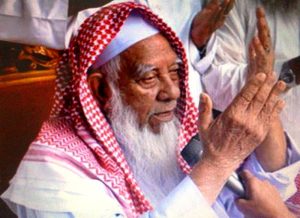Thousands of Bangladeshis marched on the streets of Dhaka on June 10 to protest derogatory comments made by two officials of India’s ruling Bharatiya Janata Party (BJP) about Prophet Muhammad. Then on June 16, they marched again in an attempt to blockade the Indian embassy in Dhaka.
Islamist parties and organizations in other countries have protested the anti-Islamic remarks as well. However, the Hefazat-e-Islam (HeI) had only minimal participation in the recent street protests.
This is in contrast to the past when the HeI spearheaded protests on the blasphemy issue. In November 2020, for instance, it protested strongly against French President Emmanuel Macron’s allegedly anti-Islam remarks in support of the blasphemous caricatures of Prophet Muhammad. HeI activists marched toward the French embassy in Dhaka to press for the shutting down of the embassy within 24 hours.
Its low profile during the recent protests in Dhaka indicates a shift in the HeI’s strategies.
Hefazat-e-Islam (literally, protector of Islam) was formed in 2010 to protest against the Awami League government’s Nari Unnayan Niti or women’s development policy, which proposed to confer equal rights of inheritance on women. The HeI was opposed to this policy as it contradicts Sharia law.
An alliance of dozens of Islamist parties, HeI, which receives support from over 25,000 Qawmi madrassas, acts as a political pressure group to enforce “religious rights.”
It came to prominence in 2013 when it put forward a 13-point charter of demands, which included, among other things, restrictions on the free mixing of women and men and the introduction of the blasphemy law in Bangladesh to prosecute atheists. These demands are similar to what the Taliban is imposing in Afghanistan.
HeI’s relations with the Awami League government have gone through several ups and downs since 2013. The government used force to quell the HeI’s Shapla Square protests in 2013. Many thought that this would fracture the relationship between the government and HeI.
However, the government reached out to the HeI. Home Minister, Asadujjaman Khan Kamal met HeI leaders several times. The meetings culminated in compromise; the government conceded eight of the HeI’s 13 demands, including conferring Master’s degree status on Qawmi Dawrah degrees, enacting the Digital Security Act to prosecute those who hurt religious sentiments, and withdrawing a sculpture of a woman (Lady Justice) from the Supreme Court premises. In return for these concessions, HeI did not publicly oppose the AL government.
However, this strategic relationship began to unravel in December 2020, when HeI leaders spoke out against sculptures of Sheikh Mujibur Rahman, Bangladesh’s founding father, and deteriorated further during the visit of Indian Prime Minister Narendra Modi to attend the country’s 50th independence anniversary celebrations. HeI protested violently against Modi’s anti-Muslim policies in India. The protests caused the death of at least 12 people. Since then, the Awami League government has intensified its crackdown on the HeI.
Authorities have found evidence of HeI’s links with militant outfits. Several HeI leaders have been arrested; nearly 100 cases have been filed against its leaders and activists. The government has also publicized HeI leaders’ private lives to tarnish their image.
Following the BJP officials’ remarks insulting the Prophet, the Bangladesh government, unlike governments in other Muslim majority countries, did not condemn the incident. Information and Broadcasting Minister Hasan Mahmud dismissed the controversy as India’s “internal issue.”
The AL government’s cautious response appears to have been driven by its strategic relations with India. “Sheikh Hasina’s government stays in power without people’s mandate and a large section of people in Bangladesh believe India has a role behind it. So naturally, the Hasina administration would not do anything that would earn the ire of the Modi government,” a leading Bangladeshi political analyst, Asif Nazrul, said, adding that the AL government does not want to “antagonize India at any cost, even if it involves the honor of Islam’s prophet.”
So what lies behind the HeI’s reluctance to protest strongly against the defamatory comments made by the BJP officials?
It is likely that the HeI is prioritizing the release of its leaders from prison over protesting on the streets on issues that the government does not want them to protest. It does not want to antagonize the government.
Besides, there is the issue of the HeI’s capacity to build pressure on the government. It is suffering from a leadership crisis due to the demise of two successive ameers –Ahmed Shafi and Junaed Babunagari. Additionally, its leadership is now fractured and dozens of activists are in jail.
Since its foundational support from the Qawmi madrassas remains intact, its manpower is strong. Once its leaders are released, the HeI will be back on the streets to protest popular religious issues.

































